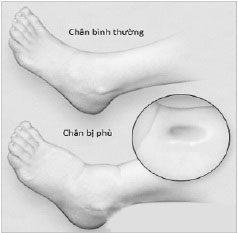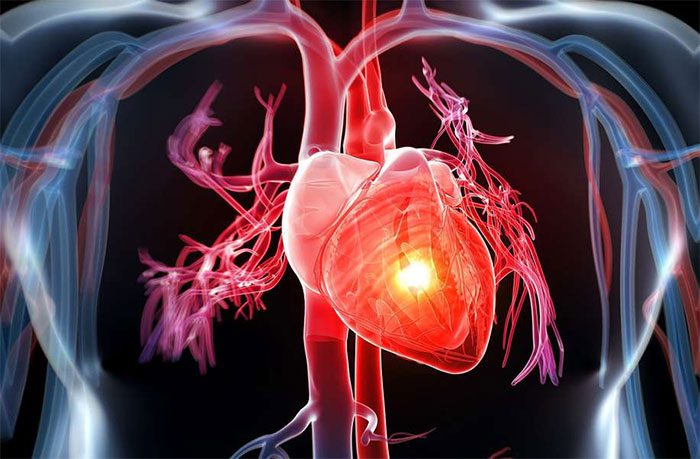The earliest symptoms of heart failure are often subtle and vague, but they can be dangerous if ignored.
Identifying Early Symptoms of Heart Failure
Heart failure occurs when the heart’s ability to pump blood effectively is weakened. Typically, the damage originates from coronary artery disease or a heart attack. However, heart valve disease, high blood pressure, or genetic conditions can also cause heart failure. When heart failure occurs, the heart can no longer pump adequately to meet the body’s oxygen-rich blood demands.

Swelling due to heart failure is soft and pitting.
To help doctors and patients quickly recognize a possible combination of heart failure symptoms, the American Heart Failure Association has developed a useful tool with 5 signs represented by the acronym “FACES.”
- F (Fatigue) = Fatigue: When the heart cannot pump enough oxygen-rich blood to meet the body’s energy needs, a common feeling is fatigue. A persistent sense of tiredness throughout the day and difficulty with daily activities, such as shopping, climbing stairs, carrying groceries, or walking.
- A (Activity limitation) = Activity limitation: People with heart failure often find it difficult to perform their normal activities as they become easily fatigued and short of breath.
- C (Congestion) = Congestion: Fluid buildup in the lungs can cause coughing, wheezing, and persistent shortness of breath. Coughing may be accompanied by white or pink-tinged mucus.
- E (Edema or ankle swelling) = Edema or ankle swelling: When the heart lacks the strength to pump blood back from the lower limbs, fluid can accumulate, causing swelling in the ankles, legs, thighs, and abdomen. A noticeable sign is that shoes feel tight. Excess fluid can also lead to rapid weight gain.
- S (Shortness of breath) = Shortness of breath: Shortness of breath during activity (most common), at rest, or while sleeping can come on suddenly and wake you up. You may often experience shortness of breath when lying flat and may need to prop yourself up with pillows. You may complain of waking up feeling tired or feeling anxious and restless. This is due to blood “backing up” in the pulmonary veins (the vessels returning blood from the lungs to the heart) because the heart cannot keep up with the supply. This causes fluid to leak into the lungs.
Fluid congestion in the lungs makes it harder to exchange CO2 in the blood for fresh O2. It can also make breathing difficult when lying down, as gravity causes fluid from below the lungs to move up into the upper body.
Always remember that the 5 warning signs mentioned do not provide a definitive diagnosis of heart failure, but these signs indicate the possibility of heart failure, requiring immediate medical attention and consultation with a doctor.
Additionally, when suffering from heart failure, you may also experience a loss of appetite, nausea, bloating, or stomach pain – due to the digestive system receiving less blood, leading to digestive issues. You may notice a rapid heartbeat or sharp chest pain. Older individuals may easily notice symptoms of memory loss, confusion, and sluggish thinking due to changes in the levels of certain substances in the blood, such as sodium, causing these conditions.

Heart failure is a weakening of the heart, unable to receive and pump blood to nourish the body.
According to Dr. Pham Dang Hoai Thuong from the Department of Cardiology – Geriatrics at Can Tho General Hospital, heart failure is a weakening of the heart, unable to receive or pump blood to nourish the body. Patients gradually lose their ability to move, carry out daily activities, and work, leading to a decline in quality of life and threatening their lives.
There are 4 stages of heart failure.
- Stage one is latent heart failure, where the patient can still engage in physical activity and normal daily life, with no symptoms of shortness of breath, fatigue, or palpitations.
- Stage two is mild heart failure, where the patient has certain limitations in physical activities and daily life. While at rest, there are no symptoms, but during strenuous activities, they may experience shortness of breath, fatigue, and palpitations.
- In stage three, the patient experiences significant limitations in physical activities and daily life. Symptoms improve at rest, but exertion can easily lead to shortness of breath, fatigue, and palpitations.
- In stage four, the condition worsens, and the patient feels discomfort with any physical activity. Daily life is greatly affected, and shortness of breath can occur even at rest, with the patient only able to perform light tasks.
Dr. Thuong states that heart failure cannot be cured, but treatment helps control and alleviate symptoms, extend lifespan, and maximize the quality of life for patients. Patients must strictly adhere to treatment, taking the correct medication, at the right dosage, and at the right times, without self-reducing doses or stopping medication even if symptoms subside. In cases of side effects, patients should immediately inform their treating physician to adjust the dosage or switch to a more suitable alternative.
Lifestyle is very important in the treatment and prevention of heart failure. Patients should engage in light exercise, avoid excessive strenuous work, refrain from smoking, and avoid alcohol. Those with heart failure need to avoid anxiety and stress, maintaining a moderate weight.
A suitable diet is recommended, which includes limiting salt intake, increasing the consumption of vegetables, fish, whole grains, drinking enough water, and limiting cholesterol (found in animal fats and fatty dairy products); replacing animal fats with vegetable oils and avoiding organ meats.


















































